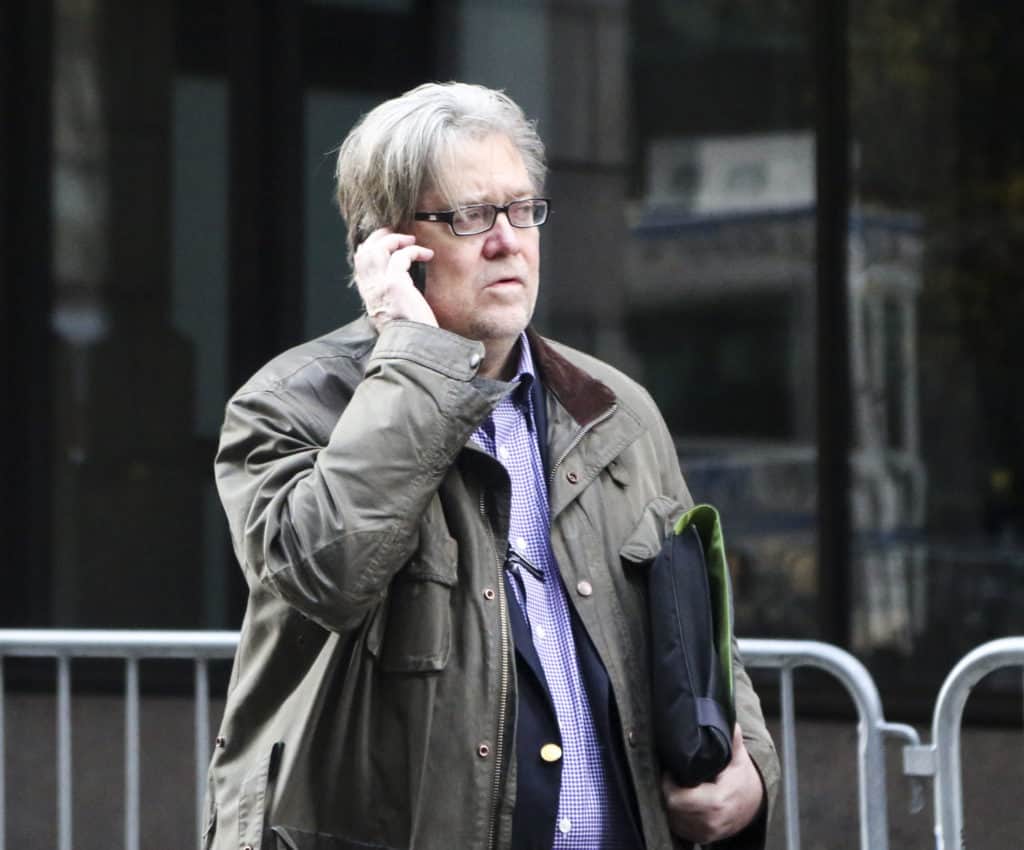Steve Bannon Tried to Destroy “Globalism.” It Destroyed Him Instead.
Zack Beauchamp, Vox, August 18, 2017

Steve Bannon (Credit Image: © Aude Guerrucci/CNP via ZUMA Wire)
Steve Bannon’s hatred for “globalists” has done him in.
The controversial senior strategist was pushed out of the White House late on Friday, according to multiple reports, chiefly due to his constant feuding with his rivals inside the administration — people like National Security Adviser H.R. McMaster and National Economic Council Chair Gary Cohn.
Bannon opposed them for essentially ideological reasons: He saw them as being soft on China, on Islam, and on immigration. He waged war against these so-called “globalists” in the press, developing a reputation for frequently leaking damaging stories to conservative media outlets — and was eventually pushed out when the president grew tired of Bannon getting so much attention and Chief of Staff John Kelly grew tired of the infighting.
That Bannon’s attempt to take power eventually led to his downfall is a funny irony. But it also means that Bannon’s crusade against globalism is on the verge of total failure.
Bannon fought so hard, by his own account, because he wanted to reshape the world, starting with the United States. This is a tremendously tough task: When you try to “drain the swamp,” the swamp creatures are going to fight back. He positioned himself against the ideas that had dominated official Washington, and indeed much of the world, for decades — and didn’t even come close to changing that consensus.
Trump does not have the discipline and policy knowledge to make this kind of radical change alone; he needed a figure like Bannon at his side.
{snip}
Bannon’s project centered on opposition to what he derisively called “globalism”: the idea of tearing down borders and linking countries through trade, immigration, and international institutions like NATO and the United Nations. He believed that Brexit and Trump’s rise in particular showed the way for a global uprising of so-called “nationalists” or “populists” against the status quo.
“We believe — strongly — that there is a global tea party movement,” Bannon said in a 2014 speech. “The central thing that binds that all together is a center-right populist movement of really the middle class, the working men and women in the world who are just tired of being dictated to by what we call the party of Davos.”
Bannon sees this movement’s central demand, sovereignty, in a disturbingly ethnonationalist way. He warned of an “invasion” of Europe by Muslims; he emphasized the need for countries that have a “Judeo-Christian” heritage to band together to fight radical Islam.
{snip}
China, in Bannon’s eyes, was also a fundamental threat. He has predicted an outright war between the United States and China — two nuclear-armed powers — in under 10 years. In a recent interview with the American Prospect’s Robert Kuttner, one of the attention-hogging stunts that allegedly contributed to his departure, Bannon described the world as a zero-sum competition between the United States and China.
“We’re at economic war with China … the economic war with China is everything,” he said. “One of us is going to be a hegemon in 25 or 30 years and it’s gonna be them if we go down this path.”
{snip}
Trump shares Bannon’s support for European right-wing nationalism, his fear of Islam, and his instinctive hostility to China. But it’s clear, at this point, that the president does not have a way to translate those ideals into policies. Trump is neither an ideologist nor a policy wonk; his feelings about the world have little in the way of connective tissue or workable implications. It’s up to others to turn these impulses into an agenda.
{snip}
Attorney General Jeff Sessions, the highest-level official who shared parts of Bannon’s worldview, doesn’t play a major role defining Trump’s foreign policy — and is busy trying to save his own job. Steven Miller has seemed to play a limited role in foreign policy decisions aside from the Muslim ban. Other than that, there’s no one at the top like Bannon.
{snip}
The “globalists,” as Bannon would call them, dominate the White House — the aides on Bannon’s side aren’t even close to their level of influence. The president has no demonstrated interest or capability to radically revise foreign policy on his own
{snip}
Absent Bannon, there’s no one to give unifying voice to a distinctively Trumpian foreign policy, no one who could really take the president’s impulses and shape them into a truly radical doctrine. Without him, in short, the Trumpiest elements of the Trump administration is rudderless on foreign affairs.
{snip}
[Editor’s Note: It is noteworthy that Mr. Bannon’s view of Islam and East Asia as the fundamental threats to the West is very similar to the view of Lothrop Stoddard.]















